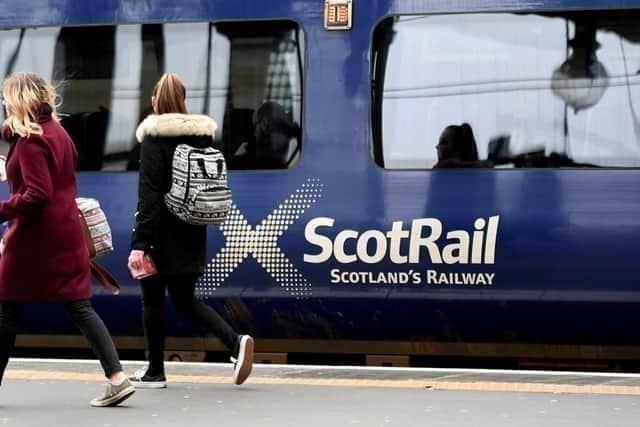Full restoration of ScotRail trains every 15 minutes on flagship Glasgow-Edinburgh line ‘highly unlikely’ for some time
Passengers are “highly unlikely” to see trains on ScotRail’s flagship route restored to their full frequency for some time because there are still too few of them returning to the railways, a senior industry source has told The Scotsman.
The indefinite suspension of the 15-minute frequency daytime service on the main Glasgow-Edinburgh line on weekdays has been confirmed by the operator, which remains at only 85 per cent of pre-pandemic passenger levels compared to 90 per cent across Britain.
Advertisement
Hide AdAdvertisement
Hide AdScotRail said the commuter market had not returned to pre-Covid numbers, with trains on the line via Falkirk High running only every 30 minutes outside peak hours since 2020.


By contrast, Saturday is now the operator’s busiest day, which led to the restoration of 15-minute frequency trains on Saturdays in May last year.
A ScotRail spokesperson said: “The new timetable will be introduced in June and we will communicate the changes in the next few weeks. There are no current plans for an increase in frequency of the express route between Edinburgh and Glasgow [known within the industry as the E&G].
"Evidence at present suggest that our current number of daytime E&G services, including our weekday peak services every 15 minutes, meets current demand.”
However, ScotRail chief operating officer Joanne Maguire told MSPs last week that increased services on other lines would see ScotRail running 93 per cent of its pre-pandemic timetable from June.
She said this included more trains running in Inverclyde, Dundee, Perth, Edinburgh and Fife, where the Levenmouth line will be opened on June 2 to coincide with the timetable change, which happens twice a year.
Professor Iain Docherty, Scotland’s leading academic rail expert, said Scottish Government-owned ScotRail was under pressure to reduce costs because rail spending had significantly increased since before the pandemic.
In addition, ScotRail has said the suspension of peak fares, which will continue for nine months until June 28, has reduced ticket revenue by about 9 per cent.
Advertisement
Hide AdAdvertisement
Hide AdProf Docherty, Dean for the Institute for Advanced Studies at the University of Stirling said: “Working from home seems to have become more commonplace in Scotland than many other parts of the UK post-Covid, and with the focus of the rail network on commuter trips to and from Edinburgh and Glasgow, ScotRail’s revenue has suffered more than most.
"But with the Scottish Government now spending 60 per cent more in cash terms on railways than it did before the pandemic, rail will come under increasing pressure to cut costs given the general squeeze on public expenditure.”
Transport Secretary Fiona Hyslop has said the peak fares suspension will be evaluated before any decision is made about its future.
However, John Mason, SNP MSP for Shettleston, said in a letter to a rail fares campaigner, seen by The Scotsman: “My suspicion is that the loss of fares revenue will not be sustainable.”
Scottish Conservatives transport spokesperson Graham Simpson said: “The promised sunlit uplands of rail nationalisation have not appeared. These figures show that.
“If we want people to return to rail in greater numbers, then services like Edinburgh to Glasgow must return to pre-Covid frequency – it is as simple as that.”
Comments
Want to join the conversation? Please or to comment on this article.